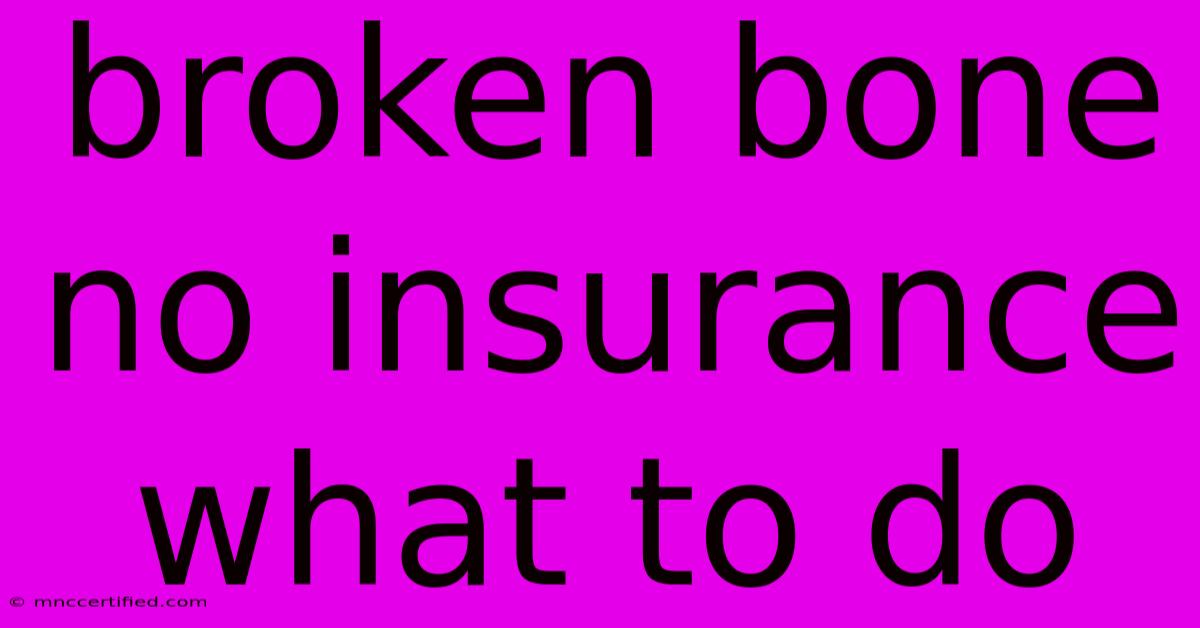Broken Bone No Insurance What To Do

Table of Contents
Broken Bone and No Insurance? Here's What to Do
A broken bone is a painful and potentially debilitating injury, and it can be even more stressful if you don't have health insurance. Facing medical bills without coverage can feel overwhelming, but don't panic! There are options available, and taking the right steps can help you manage the situation.
First Steps After a Broken Bone
-
Seek Immediate Medical Attention: No matter your insurance status, get to a hospital or urgent care facility immediately. Delays can worsen the injury and lead to complications.
-
Be Honest About Your Financial Situation: Inform the hospital staff about your lack of insurance. Many facilities have programs in place to help uninsured patients, so being upfront can be beneficial.
-
Explore Payment Plans: Inquire about payment plans or discounts offered by the hospital or clinic.
Finding Affordable Care Options
1. Free or Low-Cost Clinics: Many communities have free or low-cost clinics that provide basic medical care, including treatment for broken bones. Look for clinics that are part of a larger network, like the Federally Qualified Health Center (FQHC) program.
2. State and Local Programs: Your state or county may offer financial assistance programs for medical expenses, including those related to broken bones. Contact your local social services agency or health department for more information.
3. Emergency Medical Assistance: In some cases, emergency medical assistance programs can cover the cost of emergency care for uninsured individuals.
4. Negotiate with Providers: While hospitals may have set rates, some providers are open to negotiating payment plans or reducing bills.
5. Crowdfunding Platforms: Consider using crowdfunding platforms like GoFundMe or Kickstarter to raise funds for medical expenses.
Long-Term Considerations
-
Uninsured Discount Programs: Some medical providers offer discounts to uninsured patients. Look into such programs and ask for a breakdown of costs before treatment.
-
Apply for Medicaid: If you meet the eligibility requirements, apply for Medicaid. Medicaid is a government-funded health insurance program for low-income individuals and families.
-
Short-Term Health Insurance: Explore short-term health insurance plans, which can provide coverage for a limited time, even if you have a pre-existing condition.
Preventive Measures
-
Consider a Health Savings Account (HSA): HSAs are tax-advantaged accounts that can be used for healthcare expenses, even for individuals without employer-sponsored health insurance.
-
Shop for Affordable Health Insurance: Even if you haven't had insurance in the past, consider exploring affordable options available through the Affordable Care Act Marketplace.
Remember: Facing a broken bone without insurance can be challenging, but it's important to stay proactive and informed. By taking these steps, you can navigate the situation more effectively and secure the necessary care.

Thank you for visiting our website wich cover about Broken Bone No Insurance What To Do. We hope the information provided has been useful to you. Feel free to contact us if you have any questions or need further assistance. See you next time and dont miss to bookmark.
Featured Posts
-
Scheyer Unhappy With Flaggs Cramps
Nov 13, 2024
-
Do You Need Insurance For A Jet Ski
Nov 13, 2024
-
Ecuador Soccer Star Marco Angulo Dies At 22
Nov 13, 2024
-
London Pitbull Concert Ticket Giveaway
Nov 13, 2024
-
Hotel Room Intrusion Sparks Mums Action In Turkey
Nov 13, 2024